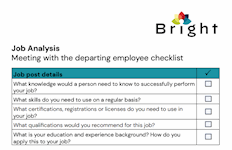
Best Practice Recruitment
Quickly create a strong base for your recruitment function!
Bright
Summary
- Tutor is available to students
Overview
Does your recruitment function need updating? Are you eager to progress in your recruitment career? Do you want to wow candidates and hiring managers? Our course does all this and more!
Bright’s experience puts us in the best position to help you remove any ambiguity from your recruitment processes, providing you with a more time and cost-efficient system that will protect your brand and attract the right people to you.
Recruitment can be carried out in an infinite combination of different processes and practices. Although each recruitment campaign is always unique, there are some core pieces of best practice that have formed over time.
As laws, society and skills are constantly evolving, so does recruitment best practice. This course focuses on how you can ensure that you are recruiting in the right way for your organisation's needs and plans. From analysing the job requirements to providing a candidate with a job offer. This course includes 8 lessons made up of 92 topics.
Course media
Resources
- Summary of our courses -
Description
Best Practice Recruitment includes 8 lessons, an hours consultation support and access to a tutor via email. Each lesson includes a quiz and many of the lessons include resources.
We are passionate about recruitment, care deeply about our clients, and always work with integrity.
Our values are:
Passion for providing personalised and tailored services, with proven efficacy and data-driven results.
Care for our clients. We appreciate that everyone is busy and stressed, so we’re here to help and take that pressure off.
Integrity, we will always act with integrity, offering the most fitting and beneficial advice to our clients, with the intention of building solid foundations for long-term relationships.
The lessons that are included in this course are:
Job Analysis
This module covers how to research who you need to recruit. It is the prerequisite step to planning your recruitment campaign and the first step towards your new employee starting employment.
Done correctly, job analysis forms the backbone of your entire recruitment campaign. Done incorrectly, job analysis can lead you down the incorrect path, ending in the hire of the wrong person for your job post.
Recruitment Planning
By this stage you should know what skills, experience and knowledge is required to perform well in the vacant job post. Recruitment planning creates a bespoke recruitment process for your campaign, based solidly on your job post requirements.
Recruitment Marketing
This module looks at how best to market your job vacancy. Whether this is through the more traditional medium of print or through a job board, there are a lot of points to consider.
Each method has a multitude of advantages and disadvantages. Making the right or wrong decision at this stage can be the difference between filling your job vacancy and not filling it.
Shortlisting
Shortlisting is the process of deciding which of your applicants to take through to the next stage of your recruitment process, the assessment stage.
This module covers all you need to know about successfully shortlisting the right candidates. The module is focused on helping you become objective and accurate recruiters.
Giving Feedback
Feedback can be used for all sorts of situations, from a member of staff under performing to providing feedback to an unsuccessful candidate.
Done right it can be a valuable tool to help people progress, but done poorly it can impact on your organisation's reputation and demotivate the receiver.
Assessment and Selection
Assessing candidates during the recruitment process involves understanding whether a candidate has the experience, talent, skills and values required to perform well in a particular job post.
It is the most essential part of the recruitment process as it allows you to select the right people for your job post.
Research shows that as often as 74% of the time the wrong person will be hired for the job post.
Candidate Sourcing
Candidate Sourcing is an important part of an organisation's recruiting strategy. Traditionally it is focused on advertising roles, searching candidate databases and approaching candidates through Social Media.
Recruiters who actively source candidates take an approach to go directly to candidates, rather than waiting for the candidates to come to them. Although it can be time consuming, active candidate sourcing can help to reduce time-to-fill and cost per hire.
Candidates found through this method also tend to be a better fit as the recruiters will have already conducted an initial screening of the candidate's skills and experience.
When searching for candidates it is also possible to invite candidates to a talent pool, potentially helping to cover current and future hiring needs in one process.
The Offer Stage
Recruitment is often as much about selling your organisation to a candidate as it is about the candidate selling themselves to your organisation.
At the offer stage candidates must feel they are being offered a role with an organisation that values them and that aligns with their personal values.
Although it is one of the final stages of the recruitment process, the offer stage can instantly change the candidate's views and feelings about the organisation. Even when a good impression has been created during the earlier stages.
All recruitment takes effort and it is important that the process does not fall down at the final hurdle.
Who is this course for?
This course is for recruiters of all levels, talent acquisition experts and hiring managers. Whether you work for an agency, search firm or inhouse, this course will help you understand what best practice recruitment looks like.
By the end of the course an inhouse recruiter will be able to significantly improve their organisation's recruitment processes, function and policies.
For those working within an agency, this course will help you better understand your clients and better support them with their recruitment needs.
Requirements
Experience in recruiting would be beneficial but is not essential for this course.
Career path
This course is ideal for someone looking to improve their recruitment skills and progress within recruitment. It is also a great course for managers to complete so they can better recruit for their team.
Questions and answers
Reviews
Currently there are no reviews for this course. Be the first to leave a review.
Legal information
This course is advertised on reed.co.uk by the Course Provider, whose terms and conditions apply. Purchases are made directly from the Course Provider, and as such, content and materials are supplied by the Course Provider directly. Reed is acting as agent and not reseller in relation to this course. Reed's only responsibility is to facilitate your payment for the course. It is your responsibility to review and agree to the Course Provider's terms and conditions and satisfy yourself as to the suitability of the course you intend to purchase. Reed will not have any responsibility for the content of the course and/or associated materials.







